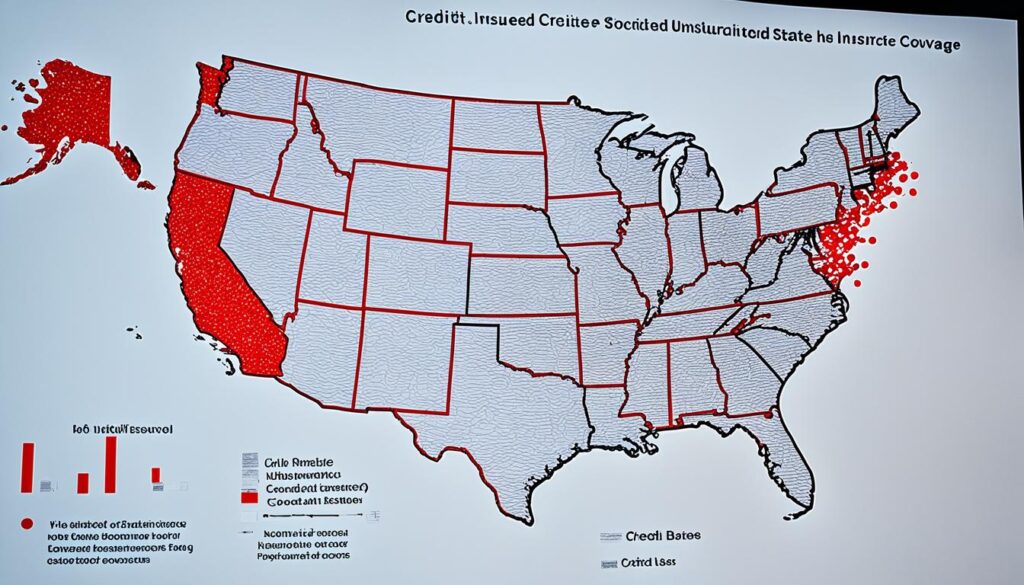Insurance Scores Impact Your Coverage have a significant impact on your insurance coverage and premiums. Insurance companies use these scores to determine the likelihood that you will file an insurance claim, which affects your auto and home insurance premiums. Your insurance score is based on your credit history and plays a crucial role in determining the cost of your coverage. It is important to understand how insurance scores are calculated and how you can improve your score to get better rates.
Key Takeaways:
- Insurance scores are used by insurance companies to assess the risk of insurance claim filings.
- Your insurance score is based on your credit history.
- A good insurance score can help lower your premiums.
- Improving your creditworthiness can improve your insurance score.
- Be proactive in monitoring your credit report to ensure accuracy.
What is an Insurance Score?
An insurance score, also known as a credit-based insurance score, is a rating calculated by insurance companies using data from your credit history. It represents the likelihood that you will file an insurance claim in the future. Insurance scores are used for both auto and home insurance coverage in states where it is allowed.
Statistical data shows that individuals with higher credit scores are less likely to file claims. Therefore, insurance companies use this information to assess risk and determine premiums. By analyzing your credit history, insurance scores provide insurers with valuable insights into your financial behavior and the likelihood of you filing a claim. This helps insurers in pricing insurance policies accurately.
It is important to note that insurance scores are not the same as credit scores, but they are calculated using similar credit history information. So even if you have a good credit history, it is still essential to understand and manage your insurance score to potentially lower your insurance premiums.
How is an Insurance Score Calculated?
Insurance scores are calculated using several factors that assess an individual’s creditworthiness and the likelihood of filing insurance claims. These factors, which overlap with those used to calculate credit scores, include previous credit performance, current level of indebtedness, length of credit history, new credit, and types of credit used. While the exact formula for calculating insurance scores varies between insurance companies and may not be disclosed to the public, it is important to understand the role that your credit history plays in determining your insurance score and, consequently, your insurance premiums.
What’s a Good Insurance Score?
When it comes to insurance scores, understanding what constitutes a good score is crucial. An insurance score typically ranges from 200 to 997, depending on the scoring model used by the insurance company. However, the threshold for a good insurance score may vary depending on the specific scoring model.
In general, a good insurance score is considered to be above 700 or 770, depending on the scoring model. Scores above this range indicate a lower risk of filing insurance claims and may result in lower insurance premiums. A good insurance score demonstrates that you are a responsible and low-risk customer in the eyes of insurance companies.

It’s important to note that different types of insurance and rating companies may have slightly different criteria for what constitutes a good insurance score. Therefore, it’s essential to check with your specific insurance provider to understand their scoring model and the corresponding range for a good score.
By maintaining a good insurance score, you can potentially save money on your insurance premiums while ensuring that you have adequate coverage. Now, let’s explore how you can access your insurance score and take steps to improve it.
Can I See My Insurance Score?
When it comes to accessing your insurance score, credit monitoring agencies like FICO and TransUnion do not provide this information directly. However, you can request your insurance score from your current or prospective insurance company. By reaching out to them, you can gain insights into your insurance score and learn how it affects your coverage.
It is important to note that your insurance score is not the same as your credit score, although both are calculated using similar information from your credit history. Your insurance score focuses specifically on factors relevant to insurance companies and their assessment of your risk profile. While a good credit score can often indicate a higher insurance score, it is not a guarantee.
“Requesting your insurance score directly from your insurance company can give you a better understanding of how your financial behavior impacts your insurance premiums.”
However, it is worth mentioning that individuals with higher credit scores often have higher insurance scores as well. This correlation arises because responsible financial behavior, reflected in a good credit score, demonstrates a lower risk of filing insurance claims. Insurance companies consider this when determining your insurance premiums.
“Accessing your insurance score is a valuable step towards understanding how your financial profile influences your insurance coverage and rates.”
By requesting your insurance score, you can gain insight into how insurance companies view your level of risk. This understanding can help you make informed decisions and take steps to improve your creditworthiness, potentially leading to lower insurance premiums.
“Requesting your insurance score allows you to be proactive in managing your overall financial health, which can have a positive impact on your insurance rates.”
Remember, your insurance score is just one factor that affects your premiums. By developing responsible financial habits, such as paying bills on time and reducing debt, you can work towards improving your insurance score and potentially saving money on your insurance coverage.

The Difference Between Credit Score and Insurance Score
While your credit score and insurance score share similarities, it is important to recognize the differences. Your credit score is a numerical representation of your creditworthiness, based on factors such as payment history, credit utilization, and length of credit history. This score is used by lenders to assess your ability to repay borrowed funds.
On the other hand, your insurance score is specifically designed for insurance companies to evaluate the likelihood of you filing a future insurance claim. It takes into account factors such as your credit history, previous insurance claims, and other relevant data. Both scores rely on your credit history, but their purposes and calculations vary.
“While your credit score captures your overall financial health, your insurance score emphasizes your potential risk as an insurance customer.”
Understanding the distinction between credit score and insurance score can help you navigate the world of insurance more effectively. By recognizing that responsible financial behavior positively influences both scores, you can take steps to improve your financial health and potentially reap the rewards of lower insurance premiums.
How to Improve Your Insurance Score
Improving your insurance score is essential for securing better coverage rates and premiums. By taking proactive measures to improve your overall creditworthiness, you can demonstrate to insurance companies that you are a low-risk customer. Here are some strategies to help you improve your insurance score:
Paying Bills on Time
One of the most crucial factors in improving your insurance score is paying your bills on time. This includes credit card payments, loan installments, and other financial obligations. By consistently meeting your payment deadlines, you establish a positive credit history and demonstrate responsible financial behavior. This reliability reflects a reduced likelihood of filing insurance claims, resulting in potential lower premiums.
Reducing Debt
High levels of debt can negatively impact your insurance score. By actively working towards reducing your debt, you can improve your creditworthiness. This includes paying off credit card balances, loans, and other outstanding debts. By reducing your overall debt-to-income ratio, you display responsible financial management, which can result in a higher insurance score.
Keeping Credit Utilization Low
Credit utilization refers to the percentage of your available credit limit that you are currently using. By keeping your credit utilization low, ideally below 30%, you demonstrate that you are not heavily reliant on credit and are effectively managing your finances. Insurance companies view this positively, as it suggests a lower risk of filing insurance claims and may lead to improved insurance scores.
It is important to regularly check your credit report to ensure its accuracy and address any errors that may negatively affect your insurance score. By implementing these strategies and maintaining responsible financial habits, you can improve your insurance score and potentially secure better coverage rates and premiums.

Factors Impacting Your Insurance Premiums
When it comes to insurance premiums, several factors come into play that can influence the cost of coverage. Insurance companies take various aspects into account to determine the risk associated with insuring an individual. Understanding these factors can help you make informed decisions and potentially save money on your insurance premiums.
Age
One of the primary factors that impact insurance premiums is your age. Younger drivers, especially those who are new to driving, often pay higher premiums for auto insurance. This is because younger drivers typically have less driving experience and are considered higher-risk by insurance companies. On the other hand, more experienced drivers, usually those in middle age or older, may benefit from lower premiums due to their proven track record on the road.
Gender
Gender can also play a role in determining insurance premiums. Statistically, males are more likely to be involved in accidents, particularly at younger ages. As a result, insurance companies may charge higher premiums for male drivers. However, it’s important to note that not all insurance companies weigh gender as heavily when calculating premiums, and the impact may vary depending on the specific insurer and state regulations.
Location
Your geographic location can significantly impact your insurance premiums. Certain areas tend to have higher rates of accidents, theft, or other risks, which can lead to higher premiums. For example, if you live in a densely populated urban area with heavy traffic, you may face higher auto insurance premiums compared to someone living in a rural area with less traffic. Similarly, the location of your home can affect homeowners’ insurance premiums, as factors like crime rates, weather risks, and proximity to fire stations may come into play.
Credit-Based Insurance Score
In addition to age, gender, and location, insurance companies often use credit-based insurance scores as a factor in determining your premiums. These scores are based on your credit history and provide insights into your financial responsibility and the likelihood of filing insurance claims. Individuals with higher credit-based insurance scores are often seen as lower-risk, potentially resulting in lower insurance premiums. It’s important to note that credit-based insurance scores are separate from traditional credit scores, although they use similar credit history information.
Understanding the factors that impact your insurance premiums can empower you to make informed decisions when it comes to selecting coverage. While you may not have control over certain factors like age and gender, you can take steps to improve your credit-based insurance score and potentially lower your premiums. By demonstrating responsible financial behavior and maintaining a good credit history, you can work towards obtaining more affordable insurance coverage.
States with Restrictions on Credit-Based Insurance Scores
Several states in the United States have implemented restrictions or prohibitions on the use of credit-based insurance scores by insurance companies for rating insurance premiums. These states include California, Hawaii, Massachusetts, Michigan, Maryland, Nevada, Oregon, and Utah. In these states, insurance companies are not allowed to utilize credit information to determine eligibility or rates for auto and home insurance.
These restrictions aim to protect consumers from potential discrimination based on their credit history and ensure fair access to insurance coverage. Instead of relying solely on credit-based insurance scores, insurers in these states utilize other factors such as driving records, past claims history, and vehicle characteristics to assess risk and determine insurance premiums.
For example, California’s Insurance Code prohibits insurance companies from using credit information for personal insurance, including auto and home insurance. Hawaii also prohibits the use of credit scores for determining automobile insurance premiums. Similarly, Maryland has enacted legislation that restricts the use of credit-based insurance scores in underwriting and rating insurance policies.
It is important for consumers residing in these states to be aware of the regulations in place and understand how they may impact the use of credit-based insurance scores by insurance companies. By being informed about these restrictions, individuals can better navigate the insurance market and ensure their rates are determined fairly based on other relevant risk factors.
Impact on Insurance Premiums
The prohibition or restriction on credit-based insurance scores in these states may have implications for insurance premiums. Without the use of credit information, insurance companies rely on alternative factors to assess risk and set rates. This may result in different premium calculations compared to states where credit-based insurance scores are allowed.
For instance, in California, insurance premiums are determined based on factors such as driving record, years of driving experience, and miles driven annually, rather than credit scores. In Hawaii, insurers consider factors such as the number of years of driving experience, prior accidents, and traffic violations when determining automobile insurance premiums.
By removing credit-based insurance scores from the equation, these states aim to create a fairer insurance pricing system that focuses on factors directly related to the risk of filing claims. Consumers in these states may benefit from more transparent and equitable premium calculations.

The Importance of Insurance Scores
Insurance scores are an essential component in determining insurance premiums and assessing risk. These scores provide insight into an individual’s likelihood of filing an insurance claim, which directly impacts the cost of coverage. Insurance companies use insurance scores to determine an appropriate premium that covers potential losses while generating profit.
When calculating insurance scores, multiple factors are considered, such as credit history, previous credit performance, current level of indebtedness, and the length of credit history. The scoring process evaluates these factors to determine the level of risk associated with each insured individual.
Also Read:- What’s The Cost Of Not Having Renters Insurance?
A higher insurance score indicates a lower risk, resulting in lower insurance premiums. By maintaining a good credit history and demonstrating responsible financial behavior, individuals can improve their insurance scores and potentially save money on their coverage.
“Insurance scores provide valuable insights into an individual’s risk assessment, allowing insurance companies to accurately price their policies and safeguard against potential losses.” – Insurance Expert
Understanding the importance of insurance scores is crucial for consumers seeking affordable and comprehensive insurance coverage. By actively managing their credit history and making timely bill payments, individuals can improve their insurance scores and subsequently reduce their insurance premiums.
Benefits of Insurance Scores:
- Access to more competitive insurance rates
- Possible eligibility for additional coverage options
- Lower likelihood of policy cancellations
- Increased trust from insurance providers
Effective risk assessment through insurance scores enables insurance companies to offer fair and accurate premiums based on an individual’s creditworthiness. As a consumer, understanding the role of insurance scores empowers you to make informed decisions regarding your insurance coverage and seek ways to improve your score.

| Factors Impacting Insurance Premiums | Impact on Insurance Premiums |
|---|---|
| Age | The younger you are, the higher the premiums may be as younger individuals tend to have less driving experience and may be considered riskier. |
| Gender | While gender-based pricing varies by state, some statistical data suggests that males may pay higher premiums due to higher accident rates. |
| Location | The location of your home, particularly in areas prone to natural disasters or high crime rates, can impact your insurance premiums. |
| Insurance Score | A higher insurance score indicates a lower risk, resulting in lower insurance premiums. |
Conclusion
Insurance scores have a direct impact on your insurance coverage and premiums. By understanding how insurance scores are calculated and the factors that influence them, you can take steps to improve your creditworthiness and potentially lower your insurance premiums. Paying bills on time, reducing debt, and maintaining a good credit history can all contribute to a better insurance score.
Improving your creditworthiness not only helps in getting better insurance rates but also enhances your overall financial health. Responsible financial behavior, such as timely bill payments and debt reduction, showcases your reliability and lowers the risk of filing insurance claims, resulting in lower premiums. Regularly monitoring your credit report for any potential errors or discrepancies is crucial to maintaining an accurate and up-to-date insurance score.
In conclusion, being proactive in managing your credit and improving your insurance score can have a significant impact on your coverage and premiums. By taking control of your financial habits, you can not only secure better insurance rates but also enhance your overall creditworthiness and financial well-being. Remember, small steps like paying bills on time and reducing debt can go a long way in improving both your insurance score and your overall financial future.
FAQs
Q: How do insurance scores impact your coverage?
A: Insurance scores can have a significant impact on your insurance coverage and rates. Insurance companies use your credit history to generate an insurance score, which helps them assess the likelihood of you filing a claim. Having a good insurance score can result in lower premiums, while a poor score might lead to higher rates or potential denial of coverage.
Q: How is an insurance score calculated?
A: Insurance scores are calculated based on various factors such as your credit history, payment history, outstanding debt, length of credit history, and types of credit accounts. Insurance companies use this information to determine your level of risk as a policyholder.
Q: Do insurance companies check your credit?
A: Yes, insurance companies often check your credit when calculating your insurance score. Your credit history provides insights into your financial responsibility and can influence the insurance company’s decision regarding your coverage and rates.
Q: What is the connection between credit score and car insurance rates?
A: Your credit score can significantly impact your car insurance rates. A higher credit score is generally associated with lower insurance premiums, while a lower score may result in higher rates. Maintaining a good credit score can help you secure better car insurance rates.
Q: How can you improve your credit to lower insurance rates?
A: To improve your credit and potentially lower your insurance rates, consider managing your finances responsibly, paying bills on time, reducing debt, and monitoring your credit report for errors. By taking steps to improve your credit score, you may qualify for better insurance rates.
Q: Why do insurance companies use credit-based insurance scores?
A: Insurance companies use credit-based insurance scores as a risk assessment tool to predict the likelihood of a policyholder filing a claim. By evaluating an individual’s credit history, insurance companies can determine the level of risk associated with insuring that person.
Q: Can your credit score affect your auto insurance rates?
A: Yes, your credit score can impact your auto insurance rates. Insurers may use your credit score to calculate your insurance score, which in turn influences the premiums you pay for auto insurance. Maintaining a good credit score is important for securing affordable coverage.




